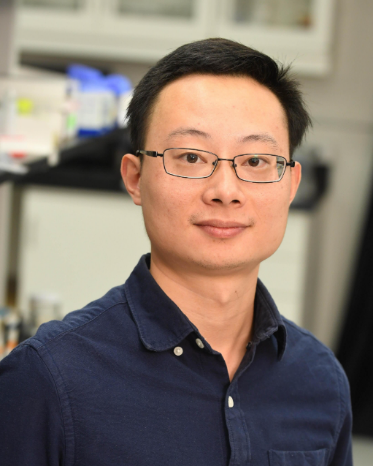 Yifei Zhang
Yifei Zhang
Professor, Full-time PI
Specializations: Biocatalysis, Enzyme Engineering, Synthetic biology, Nanobiotechnology, Biochemistry and Biophysics
Email: yifeizhang@buct.edu.cn
Office Location: Room 3-7 Computer Science Building, Beijing University of Chemical Technology
Group Website: www.zhangbiolab.cn
-------------------------------------------------------------------------------------------------------
Biography:
Dr. Yifei Zhang is a Professor in the Beijing Advanced Innovation Center for Soft Matter Science and Engineering at Beijing University of Chemical Technology. He earned his bachelor degree in 2010 and his Ph.D. degree in 2015 from Chemical Engineering Department of Tsinghua University, Beijing, China. He then joined the laboratory of Prof. Henry Hess at Columbia University in the City of New York for his postdoc training. His research focused on the reaction-transport behaviors and complex dynamics of multienzyme systems. In October 2020, he moved to Beijing to started his independent research group. His current research interests include nanobiotechnology, biocatalysis, synthetic biology and adaptive biochemical systems. He was recognized as a finalist of the 2020 Blavatnik Regional Awards for Young Scientists.
-------------------------------------------------------------------------------------------------------
Research Interests:
Enzymes are specialized proteins within living cells that are tasked with performing chemical reactions. They play not only a central role in physiological processes, but also essential catalysts in industrial biotransformation, laundry detergents, clinical diagnosis, etc. Recent developments in materials science, nanotechnology and synthetic biology are advancing the applications of enzymes from the aqueous condition to non-aqueous conditions, from a single enzymatic reaction to multienzyme reactions, and from catalysis to smart, programmable and controllable applications. Engineering enzymes for practical applications will reshape many traditional processes (such as pharmaceutical, food industry, environmental remediation, etc) toward greener, smarter and more efficient processes.
Enzyme Engineering and Immobilization:
Frequently native enzymes are not suitable for industrial or clinical use due to their low activity and/or stability. We engineer enzymes through rational mutation and immobilization to improve their activity, stability and reusability. Usually, the incorporation of functional supporting materials renders enzymes with new properties in addition to catalysis and thus opens new avenues for advanced applications. The obtained enzyme catalysts are applied to the synthesis of fine chemicals or biosensing.
Interfacial Enzyme Catalysis:
The implementation of enzymes at interfaces (e.g. air-water, water-oil, water-solid interfaces) is of particular interest when dealing with insoluble substrates such as oils, lignocelluloses, plastics and so forth. The catalytic behaviors of enzymes at the interfaces are often different from that in bulk solutions. We try to understand the mechanism of interfacial enzymatic catalysis from aspects of structural changes of proteins and the interplay between reaction and diffusion.
Multienzyme and Chemoenzymatic Catalysis:
Cascade reactions catalyzed by multiple enzymes (or sometimes combined with organic synthesis) hold new opportunities in biotransformation and have attracted interest from both academia and industry. Our research focuses on both understandings of cascade reaction kinetics and the construction of high-efficiency multienzyme processes. We are also interested in constructing enzyme reaction networks capable of performing emergent, programmable and predictable functions.
Flow-Chemistry for Biocatalysis:
Continuous-flow biocatalysis is the state-of-the-art in the synthesis of pharmaceuticals, chiral intermediates, and other high-value-added chemicals. Enzymes are often immobilization and placed in packed bed reactors, and the starting materials and reagents are continuously flown through the reactors with pumping systems. In this way, reaction and separation can take place simultaneously, thus enormously simplifying and intensifying the process.
-------------------------------------------------------------------------------------------------------
Teaching:
Undergradate level:
Biochemical kinetics; Understanding Biology by molecules and numbers
Gradute level: Soft Matter in life
-------------------------------------------------------------------------------------------------------
Awards:
2020, Finalist of the Blavatnik Regional Awards for Young Scientists
-------------------------------------------------------------------------------------------------------
Publications:
4. Yongjie Wang, Ekram Akram, Yujing Ding, Chengzhi He, Yifei Zhang*. Fusion of hydrophobicanchor peptides promotes the hydrolytic activity of PETase but not the extent of PET depolymerization. ChemCatChem, 2024, e202401252.
9. Ning Nie, Ziye Zhao, Xinwei Li, Yunting Liu, Yifei Zhang*. A proline-based artificial enzyme that favors aldol condensation enables facile synthesis of aliphatic ketones via tandem catalysis. ACS Synthetic Biology, 2024, 13, 1100-1104. doi/10.1021/acssynbio.4c00123